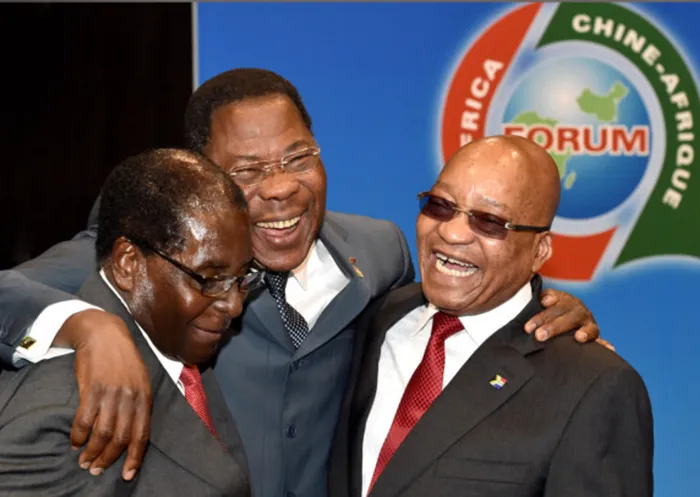Ripples of China’s $60bn will spread

(in the pic - President Robert Mugabe, President Bon Yayi and President Jacob Zuma share a light moment before the start of the 2nd day of the FOCAC Summit ). President Jacob Zuma co-chairs the FOCAC Summit with Chinese President Xi Jinping - Sandton, Johannesburg. 05/12/2015, Elmond Jiyane, GCIS (in the pic - President Robert Mugabe, President Bon Yayi and President Jacob Zuma share a light moment before the start of the 2nd day of the FOCAC Summit ). President Jacob Zuma co-chairs the FOCAC Summit with Chinese President Xi Jinping - Sandton, Johannesburg. 05/12/2015, Elmond Jiyane, GCIS
#Focac: Johannesburg - President Jacob Zuma is not well known for poetic phrases. However, as he opened the Forum on China-Africa Co-operation (Focac) in Johannesburg this past week, he delivered a poetic phrase that could define how African countries will benefit from the dollar billions pledged by the Chinese government.
“It is for this reason that we want to prioritise beneficiation and value-addition. In that way, what is buried in the belly of our soil will translate into benefit for the bellies of our citizens,” said Zuma.
The strong emphasis on localisation, beneficiation and the increase in production of value-added products by African countries dominated some of the sessions at the summit and there is consensus that extracting minerals and exporting them is not sustainable.
Chinese President Xi Jinping’s announcement of a $60 billion (R861bn) investment package for the African continent was coupled with calls for African countries to also focus on increasing exports of value-added products to the PRC and other countries.
This would necessitate the development of massive factories as countries would be transforming their raw materials into value-added products to be exported to consumer-driven economies, which China itself is surging towards becoming.
Countries like South Africa, which have historically been major exporters of raw minerals, have seen the demand and prices plummet, but have survived because their economies are diversified.
Trade and Industry Minister Rob Davies, speaking on the sidelines of the summit, lamented how exports of raw materials had decreased, and emphasised that countries would have no choice but to diversify.
“Our trade figures show a 19-percent drop in our exports to China and that’s because mineral commodities are in less demand and the prices are lower.
“The lesson from that is to diversify, and countries that are focused on single commodities for exports are in a far worse position.
“There is much more value we can add and that is the theme that is being punted, it makes this journey much more urgent. There is great value in moving up the value chain,” said Davies.
The pressure on African countries to diversify into other sectors beyond extractive industries, created by a reduction in demands for commodities, has also been met with enthusiasm by the business community.
Speaking at the Focac summit in Joburg, Black Business Council chief executive Mohale Ralebitso said there was a need to move from the normality of “made in China” to “made in Africa, with China”.
With the $60 billion investment package announced by the Chinese, they have positioned themselves to play a much bigger role in Africa’s industrialisation process, with various sectors standing to benefit.
undefinedAgriculture has emerged as one of the areas of focus.
“In terms of Africa’s agricultural modernisation plan, Chinese enterprises must be involved to create more jobs and raise the incomes of African farmers.
“We are very concerned about the poor harvests caused by the El Niño for many African farmers,” said Xi at the Focac high-level business engagement.
He added that Chinese support would help address the immediate challenges of infrastructure, lack of skills funding and the shortage of funding for industrial projects.
The summit has also seen China commit to co-operating with the continent in the sphere of peace and security, with money also pledged towards the African Union standby force.
While China has historically attempted to minimise its involvement in military matters on the continent, the rise of terrorism and the PRC’s expanding investments on the continent appear to be pushing it to be more vigilant.
Zuma highlighted the need for co-operation in keeping peace in Africa, saying the PRC’s military presence on the continent was significant.
“In addition to participating in up to 16 UN peacekeeping missions in Africa, the PRC currently has approximately 2 000 peacekeeping personnel on the ground.
“We appreciate this commitment to peace, development and progress. It gives practical meaning to the belief of President Xi that the PRC’s military capability must be utilised to achieve peace,” said Zuma.
The PRC is among the countries that have signed the memorandum of understanding with South Africa for co-operation in the development of nuclear power stations, and looks set to bid for the building of the stations.
According to Davies, the government had not yet concluded the process but China would surely be among those looking to work with South Africa in this regard.
Energy Minister Tina Joemat-Petersen refused to be interviewed by Independent Media about the PRC’s possible involvement in South Africa’s nuclear build programme.
China is already supplying Transnet with locomotives, and with the challenges faced by the state-owned companies like the Passenger Rail Agency of South Africa (Prasa) with its locomotives, the opportunity for more Chinese involvement in that arena is clear.
Indeed, as the summit concluded yesterday, the possibilities for further co-operation appear to be wider than ever before, carefully summed up by Xi when he told delegates that “the rise and momentum of Africa is unstoppable”.
SUNDAY INDEPENDENT